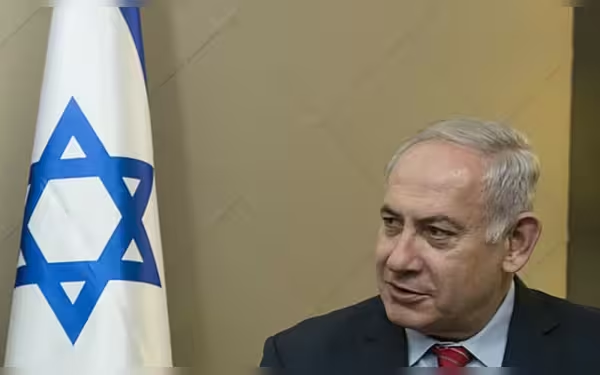Saturday, November 16, 2024 05:53 PM
Netanyahu Urges Lebanese Civilians to Evacuate Amid Escalating Conflict
- Netanyahu warns Lebanese to evacuate dangerous areas.
- Hezbollah's actions blamed for civilian peril.
- Recent strikes result in significant casualties in Lebanon.
 Image Credits: brecorder
Image Credits: brecorderNetanyahu warns Lebanese civilians to evacuate as tensions rise with Hezbollah amid ongoing military operations.
In recent days, tensions have escalated dramatically in the Middle East, particularly between Israel and Hezbollah, a powerful militant group based in Lebanon. The situation has become increasingly dire since the outbreak of war in Gaza on October 7, which has led to a series of violent exchanges across the border. Israeli Prime Minister Benjamin Netanyahu has now issued a stark warning to the Lebanese people, urging them to evacuate areas that are at risk due to ongoing military operations.
On Monday, Netanyahu addressed the Lebanese population in a video statement, saying, "Please, get out of harm’s way now. Once our operation is finished, you can come back safely to your homes." This plea came shortly after the Israeli military announced that it had targeted 800 Hezbollah positions in Lebanon. The consequences of these strikes have been devastating, with reports indicating that 274 individuals, including 21 children, lost their lives in Lebanon on that day alone, marking one of the deadliest escalations in recent history.
Netanyahu emphasized that Hezbollah is to blame for the perilous situation faced by civilians, stating, "Hezbollah has been using you as human shields. It placed rockets in your living rooms and missiles in your garage." His comments reflect a broader narrative that seeks to shift responsibility for the violence onto Hezbollah, which has been actively supporting Hamas in its conflict with Israel.
The backdrop to this conflict is complex. Following Hamas's unprecedented attack on southern Israel, Hezbollah began launching rockets into Israeli territory, further complicating an already volatile situation. As a result, hundreds of thousands of residents in northern Israel have sought refuge in bomb shelters, fearing for their safety amid the barrage of rockets.
The recent Israeli airstrike that killed Hezbollah's elite Radwan Force commander, Ibrahim Aqil, along with other militants and civilians, has only intensified the conflict. This strike was preceded by a series of explosions attributed to Hezbollah, which claimed the lives of 39 people and injured nearly 3,000 others. The cycle of violence appears unending, with each side retaliating against the other, leading to a tragic loss of life.
As the situation continues to unfold, it is crucial for the international community to pay attention to the humanitarian implications of this conflict. Civilians on both sides are caught in the crossfire, and the urgent need for dialogue and de-escalation has never been more apparent. The hope remains that through diplomatic efforts, a path to peace can be forged, allowing families to return to their homes without fear of violence. In the meantime, the call for safety and protection for innocent lives must resonate louder than the sounds of war.













